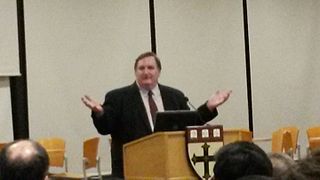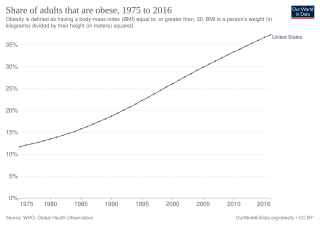Related Research Articles

A soft drink is any water-based flavored drink, usually but not necessarily carbonated, and typically including added sweetener. Flavors used can be natural or artificial. The sweetener may be a sugar, high-fructose corn syrup, fruit juice, a sugar substitute, or some combination of these. Soft drinks may also contain caffeine, colorings, preservatives and other ingredients.

Rosa Luisa DeLauro is an American politician who has been the U.S. representative for Connecticut's 3rd congressional district since 1991. She is a member of the Democratic Party. The district is based in New Haven and includes most of its suburbs. DeLauro is the dean of Connecticut's congressional delegation.
The Center for Science in the Public Interest (CSPI) is a Washington, D.C.-based non-profit watchdog and consumer advocacy group that advocates for safer and healthier foods.

Kelly David Brownell is a clinical psychologist and scholar of public health and public policy at Duke University whose work focuses on obesity and food policy. He is a former dean of Duke's Sanford School of Public Policy. Noted for his research dealing primarily with obesity prevention, as well as the intersection of behavior, environment, and health with public policy, Brownell advised former First Lady Michelle Obama's initiatives to address childhood obesity and has testified before Congress. He is credited with coining the term "yo-yo dieting", and was named as one of "The World's 100 Most Influential People" by Time Magazine in 2006.
The Rudd Center for Food Policy and Health, formerly named the Rudd Center for Food Policy and Obesity, is a non-profit research and public policy organization that promotes solutions to food insecurity, poor diet quality, and weight bias. Located in Hartford, Connecticut at The University of Connecticut, the Rudd Center was co-founded in March 2005 at Yale University by benefactor Leslie Rudd and Kelly D. Brownell. The Rudd Center moved from Yale to the University of Connecticut in December 2014.
A fat tax is a tax or surcharge that is placed upon fattening food, beverages or on overweight individuals. It is considered an example of Pigovian taxation. A fat tax aims to discourage unhealthy diets and offset the economic costs of obesity.
The American Beverage Association (ABA) is a government lobbying group that represents the beverage industry in the United States. Its members include producers and bottlers of soft drinks, such as The Coca-Cola Company, PepsiCo, and Keurig Dr Pepper, along with other non-alcoholic beverages.

Obesity is common in the United States and is a major health issue associated with numerous diseases, specifically an increased risk of certain types of cancer, coronary artery disease, type 2 diabetes, stroke, and cardiovascular disease, as well as significant increases in early mortality and economic costs.

Obesity in the United Kingdom is a significant contemporary health concern, with authorities stating that it is one of the leading preventable causes of death. In February 2016, former Health Secretary Jeremy Hunt described rising rates of childhood obesity as a "national emergency". The National Childhood Measurement Programme, which measures obesity prevalence among school-age pupils in reception class and year 6, found obesity levels rocketed in both years groups by more than 4 percentage points between 2019–20 and 2020–21, the highest rise since the programme began. Among reception-aged children, those aged four and five, the rates of obesity rose from 9.9% in 2019–20 to 14.4% in 2020–21. By the time they are aged 10 or 11, more than a quarter are obese. In just 12 months, the rate is up from 21% in 2019–20 to 25.5% in 2020–21.

A sugary drink tax, soda tax, or sweetened beverage tax (SBT) is a tax or surcharge designed to reduce consumption of sweetened beverages by making them more expensive to purchase. Drinks covered under a soda tax often include carbonated soft drinks, sports drinks and energy drinks. Fruit juices without added sugar are usually excluded, despite similar sugar content, though there is some debate on including them.

James Francis Kenney is an American politician who served as the 99th mayor of Philadelphia from 2016 to 2024. Kenney was first elected on November 3, 2015, defeating his Republican rival Melissa Murray Bailey after winning the crowded Democratic primary contest by a landslide on May 19.
Obesity in France is a growing health issue. Obesity in children is growing at a faster rate than obesity in adults.

The sugary drinks portion cap rule, also known as the soda ban, was a proposed limit on soft drink size in New York City intended to prohibit the sale of many sweetened drinks more than 16 fluid ounces in volume to have taken effect on March 12, 2013. On June 26, 2014, the New York Court of Appeals, the state's highest court, ruled that the New York City Board of Health, in adopting the regulation, exceeded the scale of its regulatory authority and as such, was repealed. The repealed regulation was codified in section 81.53 of the New York City Health Code.

Sugar-sweetened beverages (SSB) are any beverage with added sugar. They have been described as "liquid candy". Consumption of sugar-sweetened beverages have been linked to weight gain and an increased risk of cardiovascular disease mortality. According to the CDC, consumption of sweetened beverages is also associated with unhealthy behaviors like smoking, not getting enough sleep and exercise, and eating fast food often and not enough fruits regularly.

Coming Together is a 2-minute ad created and distributed by the Coca-Cola Company and launched on the night of January 14, 2013, on several cable networks.
Y. Claire Wang is an associate professor at Columbia University's Mailman School of Public Health. Her research focuses on obesity prevention strategies and techniques, such as soda taxes, and how effective they may be in reducing the economic costs of obesity.

Free refills occur when a drink's receptacle, usually that of a soft drink, tea or coffee, is allowed to be filled again by its purchaser, free of charge, after they have consumed the drink. Occasionally the glass or cup holding the drink is not reused, and the "refill" actually constitutes the acquisition of a second additional entirely new drink(s) for no added charge, usually of the same kind as the original, paid-for drink. Free refills are commonplace in the United States and Canada in traditional restaurants and fast food restaurants, while rarer in airports, cafés, or service stations. Around the world, the availability of free refills is typically scarce, but varies widely depending on the country and the type and specific ownership or chain of each establishment.

Sugar is heavily marketed both by sugar producers and the producers of sugary drinks and foods. Apart from direct marketing methods such as messaging on packaging, television ads, advergames, and product placement in setting like blogs, industry has worked to steer coverage of sugar-related health information in popular media, including news media and social media.
Dean-David Schillinger is an American general internist and former Chief of the University of California San Francisco (UCSF) Division of General Internal Medicine at San Francisco General Hospital (SFGH). In 2006, he founded the UCSF Center for Vulnerable Populations, whose mission is to advance health in poor communities. His research focuses on health communication for vulnerable populations, and the prevention and control of type 2 diabetes.
Amelia A. Lake is a British dietitian who is Professor of Biosciences at Teesside University. She works in public health, and is co-founder of the North East Obesogenic Environment Network (NEOeN). She is concerned about the impact of energy drinks on children's health.
References
- ↑ CCPHA page at the California Diabetes Program website
- ↑ "CCPHA Action Network". Archived from the original on 2014-05-22. Retrieved 2013-07-10.
- ↑ "Who we are and what we do". Archived from the original on 2013-11-02. Retrieved 2013-07-10.
- ↑ "An invitation to the beverage industry to be a (real) part of the solution". Archived from the original on 2013-07-04. Retrieved 2013-07-10.
- ↑ California Soda Tax Under Consideration
- ↑ Why a soda tax makes sense: opinion
- ↑ Bubbling Over: Soda Consumption and its link to Obesity in California
- ↑ Kick the Can
- ↑ Goldstein, Harold (2009). "Translating Research into Public Policy". Journal of Public Health Policy . 30: S16–20. doi:10.1057/jphp.2008.49. JSTOR 40207248. PMID 19190571. S2CID 32632387.
- ↑ Glauser, Wendy (2011). "Soda war heats up". Canadian Medical Association Journal . 183 (15): E1095–E1096. doi:10.1503/cmaj.109-3965. PMC 3193140 . PMID 21911549 . Retrieved 13 July 2013.
- ↑ Soda tax would be boon to schools
- ↑ "Legislative Successes". Archived from the original on 2013-01-25. Retrieved 2013-07-11.
- ↑ "Funders". Archived from the original on 2014-05-22. Retrieved 2013-07-17.